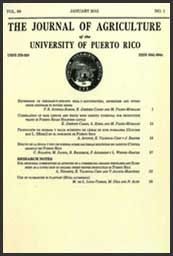Abstract
In two experiments, we studied the characteristics of ensiling and aerobic stability of triticale (x Triticosecale spp.) ensiled with or without a homolactic bacterial inoculant (HBI). The first experiment used 60 vacuum-sealed 0.946 L glass jar mini-silos (GJ) to determine the effect of ensiling on pH, dry matter recovery (DMR) and temperature. Three GJ per treatment were opened on d 0, 1, 2, 3, 5, 7, 14, 30, 105 and 123 of fermentation. Across all lengths of fermentation, inoculation decreased (P<0.05) average silage pH and temperature upon opening the mini-silos but did not influence (P>0.05) DMR versus the Non-HBI silage. Both silages had a similar (P>0.05) pH at the end of 123 d of fermentation. The second experiment compared the nutritional and fermentation characteristics and aerobic stability of triticale ensiled with or without HBI for 123 d in either 3L PVC mini-silos packed manually (PVC) or vacuum-sealed GJ. There was little difference (P>0.05) in silage nutrient content using PVC or GJ mini-silos, nor did inoculation affect these variables. Ensiling triticale decreased (P<0.05) its 30 h neutral detergent fiber (NDF) digestibility, the lowest value being that of Non-HBI/ PVC silage, which differed (P<0.05) from the HBI/PVC silage, but these did not differ (P>0.05) from the GJ silages. Differences among silages were not found (P>0.05) in NDF at 240 h (uNDF240), total tract NDF digestion (TTNDFD) and rate of NDF digestion (NDFkd). Triticale ensiled well in GJ, however the amount of material ensiled may have been too small to detect differences due to inoculation.Downloads
Download data is not yet available.

